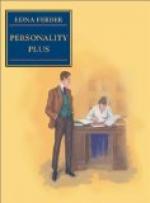“The coy stuff!” echoed Jock. “I hadn’t thought much about my attitude toward the—er—the lady,”—a little stiffly.
“Well, you’d better,” answered Miss Galt crisply. She put out her hand in much the same manner as Sam Hupp had used. “Good luck to you. I’ll have to ask you to go now. I’m trying to make this magneto sound like something without which no home is complete, and to make people see that there’s as much difference between it and every other magneto as there is between the steam shovels that dug out the Panama Canal and the junk that the French left there—” She stopped. Her eyes took on a far-away look. Her lips were parted slightly. “Why, that’s not a bad idea—that last. I’ll use that. I’ll—”
[Illustration: “With a jolt
Jock realized she had forgotten all
about him”]
She began to scribble rapidly on the sheet of paper before her. With a jolt Jock McChesney realized that she had forgotten all about him. He walked quietly to the door, opened it, shut it very quietly, then made for the nearest telephone. He knew one woman he could count on to be proud of him. He gave his number, waited a little eager moment, then:
“Featherloom Petticoat Company? Mrs. McChesney.” And waited again. Then he smiled.
“You needn’t sound so official,” he laughed; “it’s only your son. Listen. I”—he took on an elaborate carelessness of tone—“I’ve got to take a little jump out of town. On business. Oh, a day or so. Rather important though. I’ll have time to run up to the flat and throw a few things into a bag. I’ll tell you, I really ought to keep a bag packed down here. In case of emergency, you know. What? It’s the Athena Toilette Preparations Company. Well, I should say it is! I’ll wire you. You bet. Thanks. My what? Oh, toothbrush. No. Good-by.”
So it was that at three-ten Jock McChesney took himself, his hopes, his dread, and his smart walrus bag aboard a train that halted and snuffed and backed, and bumped and halted with maddening frequency. But it landed him at last in a little town bearing the characteristics of all American little towns. It was surprisingly full of six-cylinder cars, and five and ten-cent stores, and banks with Doric columns, and paved streets.
After he had registered at the hotel, and as he was cleaning up a bit, he passed an amused eye over the bare, ugly, fusty little hotel bedroom. But somehow, as he stood in the middle of the room, a graceful, pleasing figure of youth and confidence, the smile faded. Towel in hand he surveyed the barrenness of it. He stared at the impossible wall paper, at the battered furniture, the worn carpet. He sniffed the stuffy smell of—what was that smell, anyhow?—straw, and matting, and dust, and the ghost-odor of hundreds who had occupied the room before him. It came over him with something of a shock that this same sort of room had been his mother’s only home in the ten years she had spent




